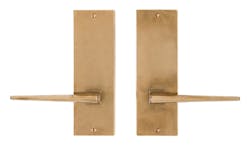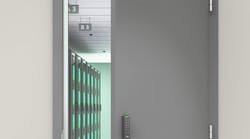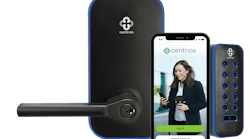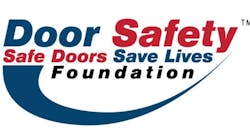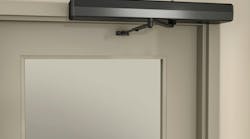Hospitals are an important institution in the United States as well as other nations. There are 5,534 of them registered in the United States as of 2017, with 894,574 staffed beds (http://bit.ly/2PkbKwg).
Among the many challenges that these institutions face, these are three that locksmiths have it within their power to affect in a meaningful way:
- The transmission of diseases (nosocomial infections)
- Health Insurance Portability Protection Act (HIPPA) compliance
- Protection of newborns from harm, including kidnapping.
In this article, we’ll take a brief look at some of the issues and solutions that you, as a locksmith, may be able to provide community hospitals in your locale, including local clinics and nursing facilities. The potential for both profit and business building is beyond measure.
Transmission of Disease
No one should ever visit a hospital and come away with a disease that will inevitably make them ill or possibly kill them. But this phenomena takes place all too often in our local community hospitals, enough so that those responsible for health and safety routinely look for ways to reduce risk.
Before diving into the solution for the transmission of nosocomial infections, let’s take a quick look at the definition of hospital transmitted diseases as provided in an article published in Wikipedia:
“A hospital-acquired infection (HAI), also known as a nosocomial infection, is an infection that is acquired in a hospital or other health care facility. To emphasize both hospital and non-hospital settings, it is sometimes instead called a health care–associated infection (HAI or HCAI).[1] Such an infection can be acquired in hospital, nursing home, rehabilitation facility, outpatient clinic, or other clinical settings. Infection is spread to the susceptible patient in the clinical setting by various means” (http://bit.ly/2nP4Kuw).
Additionally, “Though infections are just one measure of a hospital’s safety record, they’re an important one. Every year an estimated 648,000 people in the U.S. develop infections during a hospital stay, and about 75,000 die, according to the Centers for Disease Control and Prevention (CDC). That’s more than twice the number of people who die each year in car crashes. And many of those illnesses and deaths can be traced back to the use of antibiotics, the very drugs that are supposed to fight the infections” (http://bit.ly/2KNHHts).
According to Health Line (http://bit.ly/2MB8EoW), infectious diseases are transmitted from person to person by direct or indirect contact. Certain types of
viruses, bacteria, parasites, and fungi can all cause infectious disease. Malaria, measles, and respiratory illnesses are examples of infectious diseases. Simple preventative measures, such as frequent hand washing, can cut down on disease transmission.
Antimicrobial Door Hardware
One powerful solution to the transmission of disease, not only in hospitals, clinics, and nursing homes, but also in restaurants and other public places, is that of Antimicrobial Door Hardware (ADH).
Susan Grossinger, head of HOK Product Design with Rocky Mountain Hardware of Hailey, ID, said that her company can offer an antimicrobial surface that adds even more to its sales appeal. “This will [also appeal to] specifiers not only in the healthcare field, but crossing over into educational facilities, public and institutional; corporate; hospitality; aviation and any other type of projects where there are financial benefits in reducing the amount of infectious bacteria on common touch surfaces,” (http://bit.ly/2wc0M3c).
Grossinger is right. In light of the many incidents of bacterial infections that have occurred in a variety of commercial restaurants nationally in recent years, selling antimicrobial door hardware in local restaurants should be straightforward as well.
A growing number of door hardware manufacturers are working to assist in the control of physically transmittable diseases in hospital settings.
Allegion offers a wide range of products that feature a silver ion antimicrobial coating, encompassing brands Schlage, Von Duprin, Glynn Johnson and Ives. The antimicrobial coating, made using ionic silver (AG+), is specially formulated to inhibit the growth of bacteria by interrupting cell multiplication. Ionic silver coatings interact with the bonding sites on the microbe surface. The result is that the silver ions surround bacterial cells, blockading food and slowing the growth of bacteria, mold and mildew.
ASSA ABLOY company Sargent’s MicroShield™ is a hardware finish coating which permanently suppresses the growth of bacteria, algae, fungus, mold and mildew. MicroShield products are ideal for installation in countless hardware applications where vigilance in the war against bacteria and mold is critical, such as hospitals, assisted living facilities, clinics, laboratories, offices, schools and daycare facilities. The Agion antimicrobial compound is a silver-based antimicrobial agent that is incorporated into the MicroShield coating. This coating is effective against a broad spectrum of bacteria.
Trimco offers an extensive Healthy Hardware™ portfolio of products made with CuVerro® bactericidal copper alloy surfaces. Trimco says that this copper treatment kills 99.9% of bacteria in two hoursfor the life of the product, while looking like stainless steel to match other hardware products.
Hospital Infant Protection
There’s nothing worse for a mom and dad than to have their new baby snatched from under the watchful eye of hospital security.
“Between 1993 and 2006, the number of infants taken by non-family members in hospitals and health settings, often by people impersonating nurses or other staff members, fell by nearly half, compared to an earlier period. At the same time, however, the number of babies kidnapped from homes and public places nearly doubled, according to a study published in the latest issue of the American Journal of Nursing,” says JoNel Aleccia, author of "Worst Nightmare: Babies stolen from their beds," NBC News (https://nbcnews.to/2MbxOv3).
There are three ways to deal with this:
- Install electronic coded locks on all doors into and from a hospital’s infant care unit
- Install cameras at each entrance as well as inside the infant care unit
- Implement an electronic RFID-based tracking system that not only tracks the movement of each baby, but also the valid presence of mom and/or dad. These systems can be integrated with an electronic door lock so unless mom and/or dad are present, the door to the infant unit will not unlock.
For example, STANLEY Healthcare’s Hugs Infant Protection Solution is a comprehensive infant security system that includes tamper alarms, exit alarms, and out-of-unit alerts that allow staff to act quickly. The system sends alerts directly to caregivers, and automates the transfer of infants between areas of the hospital for smoother workflow and uninterrupted security. It provides tangible proof to parents that their infants are safe and secure. The Kisses® option – an audible and automatic mother/infant matching solution --provides an extra layer of protection.
As a locksmith, you have it in your power to install wireless electronic locks on the entrances of your local hospital’s infant care unit. Management and programming issues can be assumed by the hospital’s campus-wide electronic access control (EAC) system.
By installing wireless gateways at key points inside the hospital, you can connect each of the electronic locks you install with the main host computer in the main computer room or to a cloud-based processing system remote from the hospital itself. The great thing about this is that there’s only one user database to maintain. All aspects of hospital business as well as security connects to it. This includes, besides access control, human resources, accounting, patient records, and other departments.
Protecting Patient Records
Hospital facilities as well as other flavors of healthcare are required by law to safeguard and protect access to patient records. Access is to be limited to authorized personnel and other individuals who have undergone a screening process of some kind. The means whereby this is achieved is a law commonly called the Health Insurance Portability Protection Act (HIPAA).
HIPAA “...protects the privacy and security of health information and provide individuals with certain rights to their health information” (https://go.cms.gov/2PhINB0).
What it does is set standards for protected health information (PHI) in such a manner that it can be disclosed to authorized parties while the 'Security Rule' contains required safeguards that assure only those who are permitted to have access to electronic protected health information (EPHI) actually attain it.
Since HIPAA came into existence in 1996, it has undergone several transformations, each bringing with it additional privacy protections, which were implemented over a decade. The final rule became law for the vast majority of health-related concerns on May 23, 2005, while relatively small providers were required to meet HIPAA standards one year later. The Act calls for a variety of safeguards designed to limit exposure of PHI and EPHI to unauthorized individuals while readily allowing access to those that are authorized to view them.
The dual role of HIPAA is first realized by physical security precautions such as door locks, electronic access control, locking mechanisms for desk drawers, wall cabinets, file cabinets, equipment cabinets, laptop lock-down hardware, and more. Additionally, above and beyond HIPAA compliance, there’s also an enormous need to control access to the prescription drugs and medications that health care providers must have for the treatment of their patients. In some states as well as local jurisdictions there are additional laws devised to do just that.
The same electronic lock can be used on any and all patient records rooms, thus helping the hospital meet HIPAA rules and regulations. This includes the computers in each patient room that medical personnel uses to maintain detailed records.
For additional information on HIPAA, read “Cabinet Locks Go High Tech,” published in the October issue, 2015, of Locksmith Ledger magazine (http://bit.ly/2OAB6VA).
For More Information
For more information on antimicrobial door hardware, contact your local locksmith distributor or the following manufacturers:
- Corbin Russwin: 860-225-7411, http://bit.ly/2o6q9zI
- Glynn Johnson: 877-671-7011, http://bit.ly/2MPWHvC
- Marks USA: (631) 842-9400, http://bit.ly/2MOSGb1
- Rocky Mountain Hardware: 208-788-2013,http://bit.ly/2wc0M3c
- SARGENT Manufacturing Company: 800-727-5477,http://bit.ly/2MrVWK6
- Trimco, (323) 262-4191, http://www.trimcohardware.com/products/healthy-hardware/view-products/
- Von Duprin: 877-671-7011, http://bit.ly/2OUEryC
For more information on infant unit security, contact your local locksmith distributor or the following manufacturers:
- Accutech Access Control: (800) 356-2671,http://bit.ly/2LnmqHa
- ASHE Health Facilities Management: 312-893-6800, http://bit.ly/2NfEPHK
- CenTrak Inc.: 215-860-2928 http://bit.ly/2MM7qHE
- STANLEY Health Care: 888-622-6992, http://bit.ly/2MPZOnA
